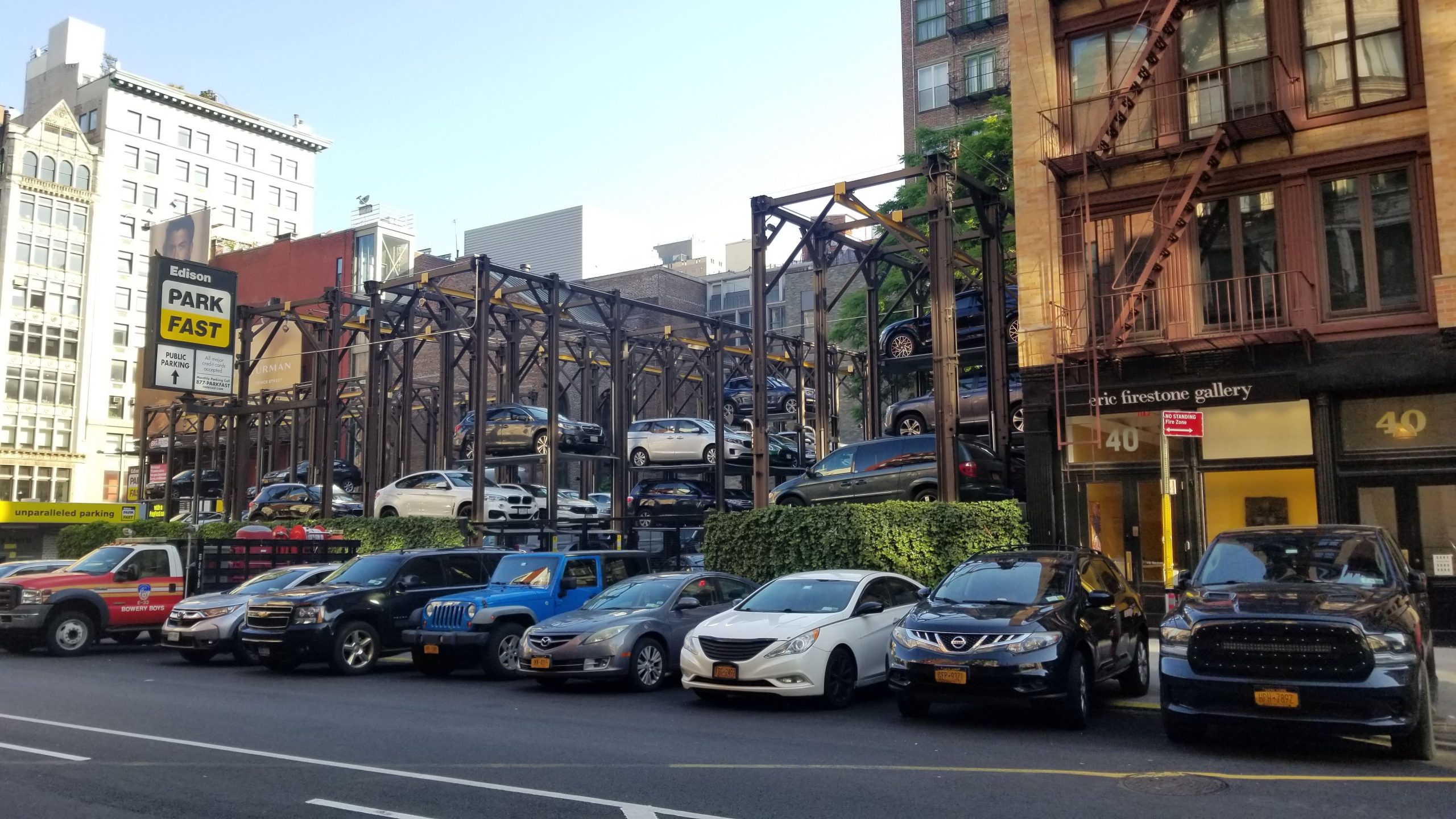By

Image Source: Gernot Wagner
With World War II in America’s rearview, cities grew and grew. Two other things grew in tandem the amount of cars and the need for places to park them in urban settings.
Governments introduced minimum parking requirements in the 1950s as car ownership skyrocketed. However, that’s all changing. Many cities are cutting these parking mandates to combat their affordable housing shortages.
Historically, zoning regulations required developers to build a certain number of parking spaces per the space of their buildings, leading some cities to have disproportionate numbers of available parking. Des Moines, Iowa for example has been found to have about seven parking spots for each resident while parking spaces in Jackson, Wyoming outnumber homes 27 to 1.
Buffalo, New York, became the first major U.S. city in 2017 to eliminate parking minimums, which supporters say helps reduce carbon emissions, improve walkability, and opens space to build homes. Since then, more than 50 U.S. cities have now taken steps to remove parking minimums, including Minneapolis, Minnesota, Hartford, Connecticut, Santa Monica, California, Anchorage, Alaska, Raleigh, North Carolina, and Gainesville, Florida.
“We eliminated parking minimums to help reduce the cost of building housing, retail, and commercial spaces with the goal of building more walkable communities,” said Raleigh Mayor Mary-Ann Baldwin. “These mixed-use centers can share parking. We also hope to see this used more heavily along our Bus Rapid Transit corridors and near our transit center downtown.”
A study of 12 U.S. cities conducted by UCLA Urban Planning Professor Donald Shoup found that the average construction cost per parking space is $34,000.

Image Source: AdobeStock
According to Raleigh’s Planning and Development Director Patrick Young, eliminating parking minimums not only provides a cost savings to apartment builders, it allows them to create more units. In talking further about the impact of this move, “Having enough housing to meet demand is the only way to manage or mitigate our housing crisis that we have in all of our major cities.”
Small businesses can also be hurt by archaic parking mandates. A coffee shop in Dallas delayed its opening in 2023 because the owner was required to build 18 parking spots. Dallas requires at least one parking space for every 100 square feet for restaurants, per the city code introduced in 1965.
“Parking mandates are arbitrary, outdated and they lead to restrictions on how our communities can develop,” said Parking
Reform Network President Tony Jordan. “A lot of the cost is really what isn’t there as a result of the parking. Your business district is more spread out, so there’s less opportunity for someone to go into one store and then another store.”
Some cities such as Branson, Missouri, and Cambridge, Massachusetts have not only eliminated parking minimums but also adopted parking maximums to limit how much parking could be provided in city zoning districts. The pandemic’s acceleration of remote work has also supported the feasibility of reduced parking in cities with less people driving to a traditional office.
“All of our endeavors related to transportation planning have been trying to transition people to sustainable modes of transportation—more biking or walking and less people driving alone,” said Iram Farooq, Cambridge’s assistant city manager for community development. “We are relatively transit rich and parking is so expensive to build, so [parking mandates] were a particular concern for affordable housing. More space for humans to sleep is more important than space for cars to sleep.”
Asphalt traps heat and creates rainwater runoff, so parking construction also comes at a cost of the environment. A 2008 study from nonprofit Transportation Alternatives found that New York drivers created 366,000 excess vehicle miles driven per year and produced 22 tons of CO2 emissions per block just during their time spent “cruising” or searching for a parking spot on a 15-block area of the Upper West Side.
New York City is planning to introduce congestion pricing that would charge drivers a $15 toll to enter midtown Manhattan. Paris voters have approved to triple the parking fee for SUVs and other large cars as major cities around the world target cars in the fight against climate change. The German city of Koblenz is now charging parking fees based on the size of the vehicle.
“Parking minimum [bans], parking fees based on size of vehicle, and so on—it is simply what one might call a shift in norms that seems to be happening as we speak,” said Gernot Wagner, climate economist at Columbia Business School. “It is one of these socio-economic tipping points.”

Image Source: City of New York
In the mid-size Sun Belt city of Raleigh, Mayor Baldwin faces challenges from private real estate financers—lenders, bankers, and REITs—who don’t want to fund projects without the expectation of certain parking space totals. While developers are building commercial and residential units with less parking, the city hopes to one day see new projects open with no parking in areas and strong public transit options.
“I would say one of the big challenges is that financiers still require a certain amount of parking. We are hopeful that this will change as they see for themselves that large amounts of parking do not help build a community. Rather, it has negative impacts,” said Baldwin. “If we want to encourage people to take transit, ride their bikes, and walk, limited parking makes sense and is a better use of space.”
Magazine
Playmaker Events
Connect with playmaker